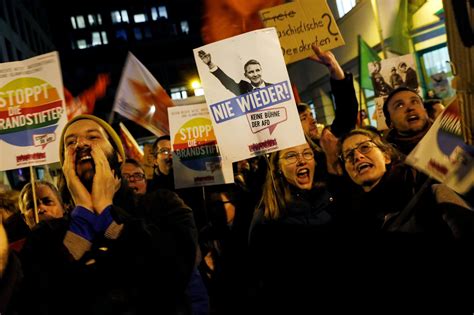In the East German town of Riesa, a powerful movement unfolded with thousands of individuals coming together on a Saturday. Their mission was clear – to obstruct the far-right Alternative for Germany (AfD) party congress. The air vibrated with chants of
“no to Nazis”
as protesters strategically blocked off roads leading to the convention venue. This bold act not only disrupted the flow but also hindered many of the 600 delegates from reaching their destination promptly, causing an unexpected delay in kicking off the proceedings.
The atmosphere crackled with tension and determination as demonstrators stood firm in their stance against what they deemed as intolerable ideologies. The presence of around 10,000 passionate individuals painted a vivid picture of unity and resistance in Riesa over that eventful weekend.
Within the walls of the gathering, delegates were gearing up for crucial decisions amidst this charged environment. One key agenda was the formal nomination of party co-leader Alice Weidel as their contender for chancellor in the upcoming snap federal elections slated for Feb. 23rd. This move symbolized a pivotal moment for AfD’s political strategy and aspirations.
Amidst heated discussions and fervent debates, another significant milestone awaited approval – AfD’s campaign manifesto. The draft version carried weighty propositions advocating stern immigration policies and even proposing Germany’s exit from the Eurozone. These radical stances underscored AfD’s positioning on critical national matters, setting them apart in Germany’s political landscape.
As political tensions soared high, so did public opinion regarding AfD’s growing influence. Polls hinted at an upward trajectory placing them firmly in second place with an estimated 20 percent voter support backing their policies. Such statistics underscored a concerning reality for some while instilling hope and conviction in others supporting AfD’s vision for change.
In an unexpected turn of events that garnered attention globally, tech tycoon Elon Musk publicly endorsed Weidel during a live chat session on X platform this week. His strong statement urged voters to consider supporting the far-right party as a means to
“save Germany.”
This unprecedented move injected a fresh wave of curiosity and debate into an already charged political scenario.
While Weidel might clinch her party’s nomination amidst these whirlwind developments, experts forecast slim chances of her ascending to Chancellorship or securing a place within the future government corridors. Friedrich Merz emerged as a formidable contender from center-right Christian Democratic Union (CDU), leading polls currently poised to succeed Olaf Scholz – the incumbent center-left figure battling challenges on multiple fronts.
Merz unequivocally denounced any form of collaboration with far-right factions like AfD echoing sentiments shared by other parties expected to gain seats in Bundestag post-elections.

